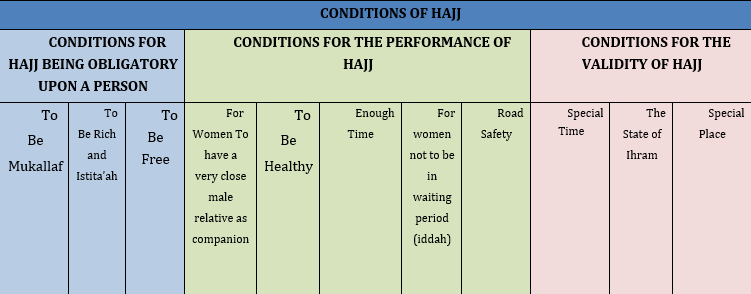What are the conditions of hajj in islam? What are the 7 stages of hajj?

a. Conditions for Hajj Being Obligatory upon a Person
To be an adult Muslim of a sound state of mind: If a Muslim performs pilgrimage before the age of puberty, it does not remove the obligation of pilgrimage. This person must perform pilgrimage again after he becomes well-off.
The pilgrimages that are performed after performing the obligatory pilgrimage will be supererogatory pilgrimages.
To be free: Pilgrimage is not obligatory upon slaves and captives.
To be rich and have the ability to perform pilgrimage (istita’at): The person must have the money he needs for the journey, and financial means to provide himself and all those under his care throughout the pilgrimage, in other words, he must have the ability to go to pilgrimage.
If one lives in a place distant enough to Mecca to be considered a traveler, he should have financial means to cover his travel expenses. If the person who lives in a place less than 90 km away from Mecca and has the strength to walk, he is obligated to go to pilgrimage even on foot.
When pilgrimage becomes obligatory on a believer, it is an eminent task that needs to be fulfilled without delay. According to Imam Shafii and Imam Muhammad, it can be postponed if one is determined to perform it in the future and there is no reason to fear that on account of this delay, the opportunity to perform the hajj will be missed, due, for example, to old age, the inability to reach his destination, or a loss of his wealth. However, these Muslim jurists also say that it is a Sunnah and more cautious attitude to perform hajj as soon as one gets the opportunity.
It is recommended to the person who will go to pilgrimage to settle his debts before setting out on the journey, make up with the people with whom he is angry, repent for all his sins, ask the forgiveness of all kith and kin, to write his will in the presence of witnesses, and have a good and easygoing fellow traveler to accompany him in the pilgrimage journey. It is also recommended to prepare more than enough money and provisions in order to help the needy both on the journey and during pilgrimage.
b. Conditions for the Performance of Hajj
The following conditions are sought in order to have the ability to perform the hajj:
To be healthy: It is not obligatory personally to perform pilgrimage upon those who are paralyzed or too ill or too old to bear the pilgrimage journey. In the case of someone who is blind, he is not obliged to perform the hajj unless he finds a guide, even if he must hire him, provided that he is able to afford the cost. If he finds no guide, or if he finds a guide but cannot afford to hire him, he is not required to perform the hajj even if he is a resident of Mecca and is adept at walking with a cane.
To have enough time: One must have sufficient time to go to pilgrimage. Those who are in jail, or kidnapped, and those who are prevented from going to pilgrimage are not obligated to perform hajj as long as their situation continues.
To have road safety: If an epidemic or war breaks out in Mecca, it may lift the obligation for that year.
For Women to have a very close male relative as companion: A Muslim woman who wants to go pilgrimage should be accompanied by a mahram (husband or very close male relative e.g. father, son etc.), or three or more trustworthy women. According to Hanafi and Hanbali Schools, it is not permissible for a woman to go on a journey without being accompanied by a mahram, even if she is with a group of trustworthy women. If she finds only one other woman to accompany her, she is not required to go on the hajj, though it is permissible for her to perform the obligatory hajj with her; in fact, it is permissible for her to go out alone to perform the obligatory hajj provided that the way is safe. In this regard, Allah’s Messenger (pbuh) said as follows, “It is not lawful for a woman believing in Allah and the Hereafter to undertake journey extending over a day and a night except when there is a mahram with her.”[1]
For Women, not to be in waiting period (iddah): If the woman who will go to pilgrimage has been divorced or her husband died recently, she must have finished the waiting period (iddah). The waiting period for a divorced woman is at least three months and for a widow, it is at least four months and ten days.
Those who have the conditions to perform hajj must personally perform hajj in that year. Those who do not fulfill any one of these conditions may perform their hajj during another year, send a deputy on their behalf, or write this in their will.
c. Conditions for the Validity of Hajj
In order to perform a valid hajj, the following three conditions must be met:
- a) Ihram: In order to perform a valid pilgrimage, one must enter the state of ihram and act in obedience with the prohibitions of the state of ihram while he is in that state.
- b) Special Time: The rites of hajj (manasik) must be performed in the months of hajj. This is stated in the Qur’an as follows: “For Hajj are the months well known.”[2]
Certain rites of hajj such as “entering the state of ihram”, “waqfa in the Plain of Arafat,” “to perform tawaf al-ifada “, “Sa’y” and “stoning the devil” etc. must be performed in specified days – the eve of Festival of sacrifice and the Days of Festival of Sacrifice.
- c) Special Place: Waqfa must be carried out in the Plain of Arafat and the tawaf must be around the Ka’bah.”
If any one of the above mentioned conditions is missing, hajj becomes invalid.
[1] Muslim, Hajj, 419, 422; Malik, al-Muwatta, Isti’dhan, 37
[2] Al-Baqara, 2: 197
Source: Fiqh1 (According To The Shafi’i School Of Islamic Law), Erkam Publications





